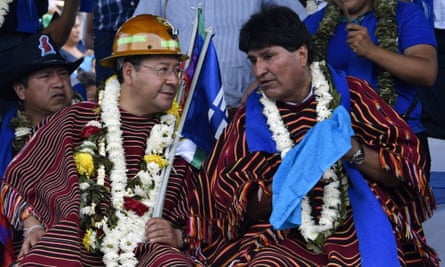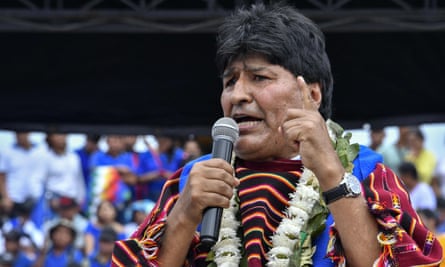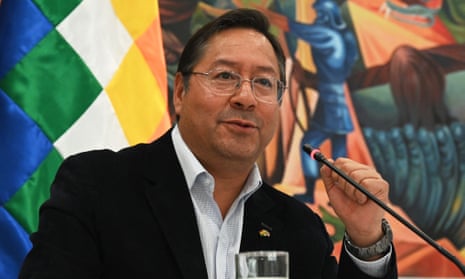Bolivia’s president Luis Arce has been expelled from his own party, amid a bitter struggle with the former president, Evo Morales, to lead the party into the 2025 election.
According to a resolution passed at the congress of the Movimiento al Socialismo (Mas) on Wednesday, Arce “expelled himself” from the party by not appearing at the meeting on Tuesday in the department of Cochabamba.
David Choquehuanca, the vice-president, and dozens more legislators, officials and activists loyal to Arce, were also expelled from the party, in a move that may still be reversed as the legitimacy of the congress is questioned.
It is the latest episode in the power struggle between Arce and Morales.
Morales was president for almost 14 years until the election in 2019, when he ran for a third consecutive term, in violation of the constitution and in defiance of a referendum result.
Morales won that election, but the result was disputed by the opposition with allegations of fraud. Amid protests and pressure from the military, Morales resigned and fled the country.
After a year of political turmoil, the Mas swept back into power under Arce, Morales’s former finance minister and chosen candidate, and Morales staged a triumphant return from exile.

After then, relations between the two men soured as it became clear both had presidential ambitions for 2025.
Morales has accused the government of trying to disqualify him from running in 2025. He also has become highly critical of government policy, while legislators loyal to him have begun voting against the government.
Amid increasingly heightened rhetoric, the two factions have traded accusations of corruption, links to drug trafficking and treason.
The feud came to a head at the Mas congress, convened by Morales, who remains leader of the party and controls its structure. The meeting was held in Lauca Ñ, a coca-growing town in Morales’s political heartland.
He had already announced his candidacy for the Mas before any primaries could be held.

Many of the Indigenous and campesino organisations that have historically backed the Mas have stayed away from the congress and questioned its legitimacy. Some have called a parallel congress to be held on 17 October in El Alto, where Arce will be present. Meanwhile, a legal challenge has been made to declare the Mas congress illegitimate.
The electoral authorities must ratify or invalidate the decisions made by the congress. The stakes are high, because the winner will possess the symbolic power of the Mas, which has dominated Bolivian politics for almost two decades.
